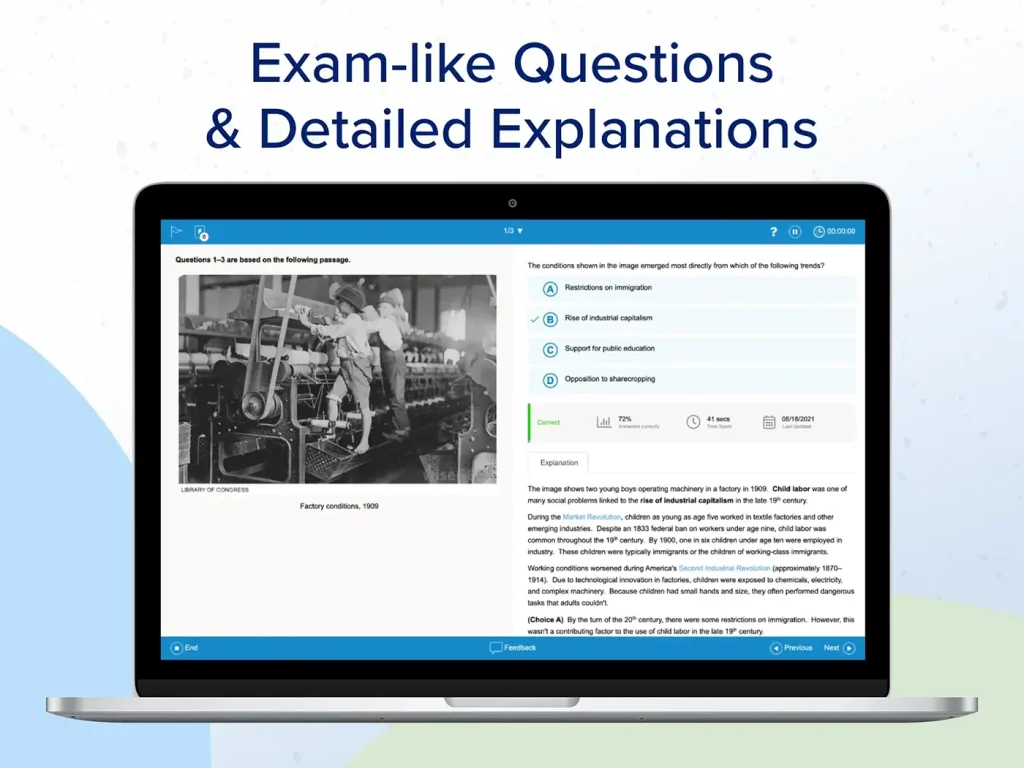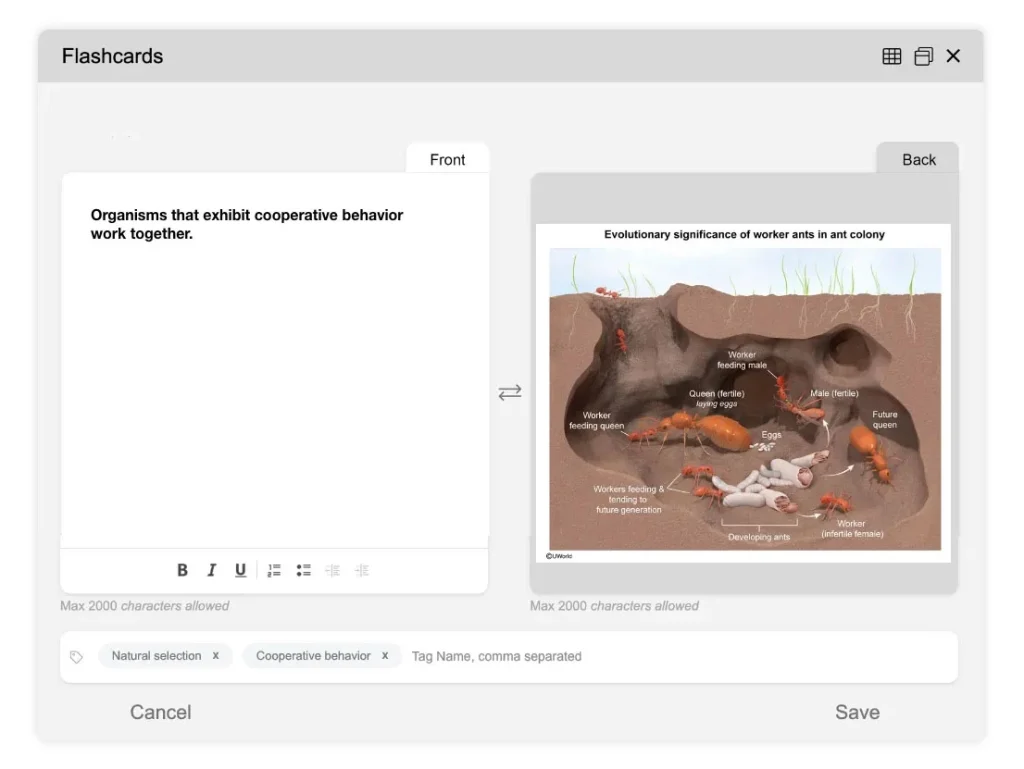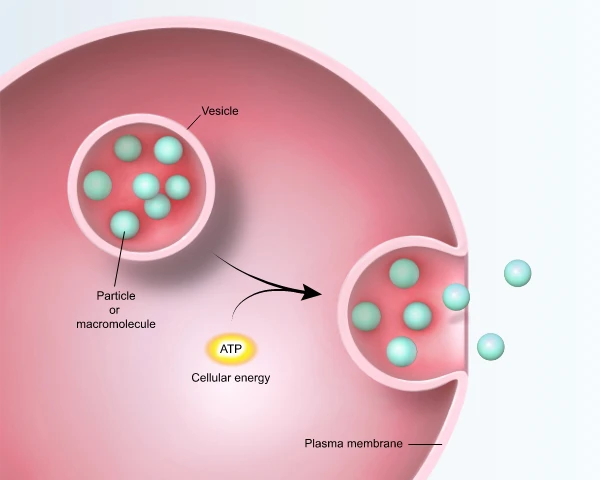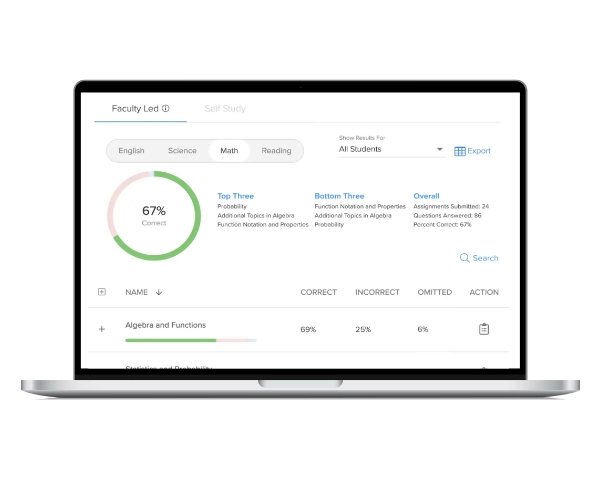On September 19, 1957, biologist Francis Crick presented his findings about gene function in what would become one of the most pivotal lectures given in the field of biology. Crick spent countless hours preparing for his presentation, even producing an 11,000-word article with detailed descriptions of his research and ideas for reference.
In the weeks leading up to the summative exam, AP® Biology teachers must also take care to ensure their students are thoroughly prepared for it. Every course topic must be spiraled through during these weeks of last-minute AP Bio review, along with regular practice questions, so that students are ready for the test. Biology teachers are meticulous in their planning because they understand that the AP Biology exam is far from simple. In 2022, 67.9% of students who took the AP Biology exam passed with a score of 3 or higher, according to the College Board®‘s score distribution report1 for that year.

Student Score Distributions on AP exams (2022)
To give their students the best chance of doing well on the exam, AP Biology teachers need to spend a lot of time planning out a rigorous summative review. We’ve provided five last-minute AP Bio tips for test preparation that can be incorporated into any content review to help make that a little bit easier.
Tip 1: Break Curriculum into Smaller, Doable Parts
Teachers spiral through key concepts in the weeks leading up to exams to make sure students remember the material on test day. However, a few weeks of last-minute AP Bio review doesn’t provide much time to go over an entire course’s worth of material. That being said, research shows that the best way to get ready for a summative test in just a few weeks’ time is to break down the study material into “bite-sized” chunks. This strategy is referred to as “chunking.”
A study2 that was published in the journal Educational Psychology Review looked at how breaking up information into smaller, easier-to-understand pieces might help students learn. The study found that chunking made students feel more assured about the material they were spiraling through. AP Bio teachers don’t have to cover an entire unit or a big foundational concept in one class. Instead, they can work on smaller parts of the unit or concept one at a time until students have reviewed everything they need to know for the test.

Another strategy AP Biology teachers can use to get their students ready for the test is “interleaving,” or reviewing several related topics at once. Research shows that when educators teach about seemingly different topics, their students learn to tell the difference between them and are better able to apply what they know.2 When AP Biology teachers use chunking and interleaving, their students are far more likely to feel ready and confident on test day.
Our choice for an AP Biology exam review guide: UWorld
Our choice for an AP Biology review guide resource for teachers planning their summative test prep is UWorld’s AP Biology Study Guide: Tips, Strategies, and Common Mistakes to Avoid.
Why We Chose It:
- Provides thorough coverage of each of the nine topics included in the AP Biology exam
- Written by AP Biology specialists with years of experience instructing and getting students ready for the test
- Provides teachers and students with useful exam-focused strategies and pointers to help them successfully prepare for the AP Biology exam. It addresses issues like time management, test-taking tactics, and how to approach various question types
- Outlines typical errors that students make on the AP Biology exam and offers advice on how to avoid them

Tip 2: Practice with Released Exams
Providing practice with previously published exams is one of the simplest ways teachers can help their students get ready for the AP Biology exam. The outcomes will almost certainly lead to higher student test scores. According to research from the University of Nebraska-Lincoln3, having students practice with realistic test questions, such as those on released exams, raised scores by an average of 15%. When students studied with questions that were different from those on the real test, test scores increased, but only by 6%.
Our choice for released exam questions: The College Board secure released exams
The best place to get released AP exams is directly from the source, so the College Board is our top pick for this tip. Although released AP exams are not available to students, AP teachers can use them for practice and review. These exams are also available in AP Classroom, both on their own and with other recently released questions from the AP Question Bank.4 AP Biology instructors can find out more about the released exams in the AP Classroom User Guides.
Why We Chose It:
- These are real exam questions from previous years, making them a trustworthy and authentic source
- Align with the AP Biology exam’s current structure and format, including the number, type, and duration of the exam’s questions
- There are many different question types and topics in previous exam questions
- Designed to cover a range of levels of difficulty, from easy to challenging
Tip 3: Multiple-Choice Practice Makes Perfect
Practicing with multiple-choice questions is, of course, an important part of getting ready for the AP Biology test. AP Biology teachers should make an effort to get their students to complete at least two multiple-choice questions a day while spiraling through review material. Multiple-choice exit tickets or bellringers can help students review key ideas that might be covered on the test.
By consistently practicing with multiple-choice questions, students can get in the habit of using annotations, paying attention to context clues, and getting rid of answers that are obviously wrong. Their test-taking efficiency and accuracy will both benefit from this habit. Students who practice multiple-choice questions may also improve their time management skills and become more accustomed to the test’s pace.
Our choice for multiple-choice practice: UWorld
Our choice for the best multiple-choice practice resource is UWorld’s Learning Tools for AP Courses. It’s a great way to incorporate multiple-choice questions into last-minute test prep for the AP Biology exam.
The explanations provided to students who use UWorld’s multiple-choice questions are superb. Adaptive learning technology gives students practice that is tailored to their level of understanding by changing each lesson. Students can use it all year to review what they’ve learned, assess their strengths and areas for improvement, and develop their knowledge and skills in preparation for the AP Biology exam. In the last few weeks of test preparation, it also gives students a quick way to review concepts and practice multiple-choice questions.
Why We Chose It:
- Give students immediate feedback, along with justifications for right and wrong responses. With the help of these thorough explanations, students can learn from their errors and deepen their comprehension of fundamental biological concepts
- with hundreds of multiple-choice practice questions, provides thorough coverage of all the subjects covered on the AP Bio exam
- Practice questions are timed, which helps students get ready for the time restrictions of the AP Biology exam and aids teachers in determining whether their students can finish the exam in the allotted time
- Give teachers the option to select particular topics and question types for their students to practice on during practice sessions. In order to help their students and ensure that they are well-prepared, teachers can focus their AP Biology final exam review on the areas where they most need assistance

Tip 4: Greater Understanding with Justifications – Studying for FRQs
Understanding the value of understanding is one of the most notable differences between education today and education a few decades ago. For students to really understand a concept, teachers need to help them figure out why it works instead of just giving them the answer. Giving students plenty of opportunities to justify their responses is important when preparing for the AP Biology test. According to a study that was published in the Journal of Computer-Assisted Learning5, students who had to justify their answers to questions had a better understanding of the material than those who were only required to provide answers. A student may comprehend the subject matter better and retain it if written explanations are added to the learning process.
Having students justify their answers in writing will prepare them for free-response questions, too. Providing online examples of excellent FRQ responses will also help students do well on the AP Bio exam. Teachers and students can work together to come up with ideas for FRQ answers by looking at sample questions.
Our choice for additional FRQ practice: APStudy.net
APStudy.net’s AP Biology Free-Response Practice Tests provide a great resource for AP Biology FRQs in addition to the questions released by the College Board.
Why We Chose It:
- Simulate the format and difficulty level of actual AP Biology exam FRQs
- Cover a wide range of topics and concepts from the AP Biology curriculum
- Answer keys and scoring rubrics provided with each practice test allow students to self-assess their performance and identify areas for improvement
- Include a variety of question types, including experimental design, data analysis, and free-response questions, giving students exposure to different types of FRQs
Tip 5: Repetition with Flashcards
Repetition is a great way to make sure that information is remembered when going over old course material and important words. Students can actively learn with flashcards and improve their retrieval skills, which helps them remember things longer. According to the Central Penn College Learning Center, “Flashcards help students to engage in active recall or a process wherein students actively engage in learning by stimulating our memories and creating lasting connections to the material.”6
When preparing their students with an AP Biology final exam review, teachers must go over a broad range of scientific ideas and crucial vocabulary words. Participating in flashcard-based activities will spiraling through concepts will keep students interested and motivated. Students can use flashcards to study on their own or in groups. Regular flashcard-based review activities in AP Bio classes can help students remember and understand important course information.
Our recommendation for AP Biology flashcards: UWorld
The UWorld flashcards feature is our pick for a great AP Biology flashcard resource. Students can review and improve their AP Bio knowledge using the flexible and practical UWorld flashcards feature. They can design their own decks and narrow in on particular subjects. Students who want to do well on the AP Biology test can use it to study because the flashcard feature can be changed and it is easy to use.

Teachers can also give students different review tasks that require them to use paper flashcards. Here are some suggestions for how to use them to prepare for the AP Biology exam.
Focus on Understanding Rather Than Memorizing:
Instead of simply memorizing the information on flashcards, try to connect it to other concepts to improve your overall understanding of the content.
Design Your Own Flashcard Deck:
Making your own flashcards forces you to interact with the material and puts the information in your own words, which helps with memory retention.
Use a Combination of Words and Pictures on Your Cards:
Making connections between the linguistic and visual representations of the information on your flashcards with both text and images can help with retention and recall.
Make Review Activities Fun with Flashcards:
Flashcard review can be made more enjoyable and engaging by including games or other enjoyable activities. This can improve retention and foster a more positive attitude toward learning.
Focus on Understanding Rather Than Memorizing:
Instead of simply memorizing the information on flashcards, try to connect it to other concepts to improve your overall understanding of the content.
Design Your Own Flashcard Deck:
Making your own flashcards forces you to interact with the material and puts the information in your own words, which helps with memory retention.
Use a Combination of Words and Pictures on Your Cards:
Making connections between the linguistic and visual representations of the information on your flashcards with both text and images can help with retention and recall.
Make Review Activities Fun with Flashcards:
Flashcard review can be made more enjoyable and engaging by including games or other enjoyable activities. This can improve retention and foster a more positive attitude toward learning.
Instead of simply memorizing the information on flashcards, try to connect it to other concepts to improve your overall understanding of the content.
Making your own flashcards forces you to interact with the material and puts the information in your own words, which helps with memory retention.
Making connections between the linguistic and visual representations of the information on your flashcards with both text and images can help with retention and recall./p>
Flashcard review can be made more enjoyable and engaging by including games or other enjoyable activities. This can improve retention and foster a more positive attitude toward learning.
Instead of simply memorizing the information on flashcards, try to connect it to other concepts to improve your overall understanding of the content.
Making your own flashcards forces you to interact with the material and puts the information in your own words, which helps with memory retention.
Making connections between the linguistic and visual representations of the information on your flashcards with both text and images can help with retention and recall./p>
Flashcard review can be made more enjoyable and engaging by including games or other enjoyable activities. This can improve retention and foster a more positive attitude toward learning.
Bonus Tip: Prepare Students with Test Day Reminders
This final suggestion may seem more like general test-day advice than the other last-minute AP Bio tips on this list, but it’s important for teachers to go over what students need to do and bring on exam day. Every year, students forget to turn off their phones, bring a pencil, or arrive late for their AP exams. However, a study by the College Board7 found that, on average, students who were early and had everything they needed for an AP exam performed 20 points better than those who were late or had forgotten their supplies. Talk about a checklist of all the preparations your students must complete for the AP Biology exam, as well as the materials they must bring to the exam.

Checklist of Reminders for AP Biology Students
The Day Before the AP Biology Exam:
Prepare everything you’ll need for the test in advance
Do not overstudy for the exam
Eat a balanced meal and get plenty of water
Make time to relax and engage in stress-relieving activities
Review test-taking strategies
Double-check the exam’s location and start time
Set multiple alarms to make sure you get up on time
A valid photo ID and all other necessary items should be packed in your bag
Plan your route to the test location
The Day of the AP Biology Exam:
bring a pen with dark blue or black ink
Bring a legal, government-issued photo ID with you
Bring your AP student packet, which includes an AP number label and a demographic sheet
Bring your exam e-ticket or registration confirmation with you
Take a watch with you to keep track of the time
Bring a snack and water. These must be left on the floor throughout the test and only touched during breaks
Key Takeaways
For teachers who want to give their students the best content review and test preparation, the final few weeks before the AP Biology exam are without a doubt crucial. Using the five suggestions in this article, AP Bio instructors can help their students feel more prepared and confident when taking exams.
Learn more about how we support AP educators who strive to make a difference in the lives of their students with our Learning Tools for AP Courses.
References
- Student Score Distributions* AP exams – May 2022. (n.d.). Retrieved March 22, 2023, from https://apcentral.collegeboard.org/media/pdf/ap-score-distributions-by-subject-2022.pdf
- Rohrer, D. (2012, July 28). Interleaving helps students distinguish among similar concepts – educational psychology review. SpringerLink. Retrieved March 21, 2023, from https://link.springer.com/article/10.1007/s10648-012-9201-3
- The effects of age and professional expertise on … – Wiley Online Library. (n.d.). Retrieved March 22, 2023, from https://onlinelibrary.wiley.com/doi/abs/10.1002/acp.1467
- Formative assessment. AP For All. (n.d.). Retrieved March 29, 2023, from https://apforallnyc.com/formative-assessment/
- Let me explain! the effects of writing and … – Wiley Online Library. (n.d.). Retrieved March 22, 2023, from https://onlinelibrary.wiley.com/doi/10.1111/jcal.12608
- Libguides: Learning Center – Study Skills: Flashcards. Flashcards – Learning Center – Study Skills – LibGuides at Central Penn College. (n.d.). Retrieved March 22, 2023, from https://guides.centralpenn.edu/c.php?g=695569&p=4999857
- Source: College Board. (2021). AP Exam Score Distributions. Retrieved from https://reports.collegeboard.org/media/pdf/2021-ap-student-score-distributions_1.pdf




